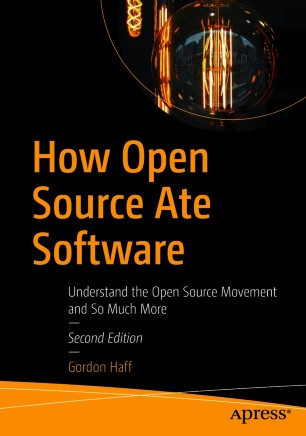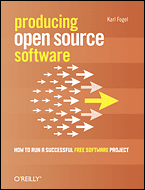Free and Open Source Software (CS3350)
Course Information
| Title: | Open Source Software |
| Institution: | Metropolitan State University of Denver |
| Course ID: | CS 3350 |
| Semester: | Spring 2023 |
| Meetings: | Tuesdays & Thursdays Noon - 1:00PM |
| Location: | AES 285 |
| Credit Hours: | 4 |
| Prerequisites: | CS 2050 and CS 3250 (CS3250 may be taken simultaneously) |
| Policies: | http://www.jodypaul.com/cs/foss |
| Instructor: | Dr. Jody Paul (schedule & office hours) |
| E-mail: | jody @ computer.org |
| Office: | AES 200Q |
| Students are required to attend
all sessions during the first week of class. Students Rights and Responsibilities - Class Attendance |
|
Course Description
The source code for Free and Open Source Software (FOSS) is available to others to view, copy, learn from, alter, or share. This course delves into the FOSS movements addressing: advantages and disadvantages of open source; open source licensing models; collaborative public development; common and best practices; and, how to contribute to FOSS projects. During the course, students actively investigate, engage with, and have guided opportunities to contribute to established FOSS projects.
Books, References, and Resources
Required Books
 Open Source Software Exploration for Students, Version 2022.1.0
Open Source Software Exploration for Students, Version 2022.1.0
by Greg DeKoenigsberg, et al.
TeachingOpenSource.org
CC-BY-SA (2010,2022) [online]

by Gordon Haff
APress (2021); ISBN 9781484267998
[full-text download]
https://skyline.ucdenver.edu/record=b6062613~S0
Access requires logging in as an MSU Denver student. [Direct Link]
 Forge Your Future with Open Source
Forge Your Future with Open Source
by VM (Vicky) Brasseur
Pragmatic Programmers (2018); ISBN 9781680503012
[online]
https://skyline.ucdenver.edu/record=b4031129~S0
Access requires logging in as an MSU Denver student. [Direct Link]
 Producing Open Source Software
Producing Open Source Software
by Karl Fogel
CC-BY-SA (2020)
[online and full-text download]
Supplemental References and Resources
- The Open Source Way,
theopensourceway.org (accessed 9 January 2022)
- The Architecture of Open Source Applications,
aosabook.org (accessed 2 January 2022)
- SVN Tutorial,
tutorialspoint.com (accessed 2 January 2022)
- Learn Git Version Control using Interactive Browser-Based Scenarios
by B. Hall (accessed 2 January 2022)
- How to Report Bugs Effectively by Simon Tatham (1999) (accessed 2 January 2022)
- Debug It! Find, Repair, and Prevent Bugs in Your Code by P. Butcher (2009)
- ACM Code of Ethics and Professional Conduct
by ACM; acm.org (2019); Available Online
- Software Engineering Code of Ethics and Professional Practice
by IEEE-CS/ACM; ieee.org (1999); Available Online
- Software Engineering Resources
jodypaul.com (2018); Available Online
General Philosophy
Free and Open Source Software is dynamic, with both principles and practices changing rapidly. This is often difficult for those students who have come to expect a stable body of knowledge with unequivocal answers to questions and approaches to success. Here, you are often required examine the context of a situation, reflect upon possible alternatives, select the most suitable, and justify your decision.
This course is intended to provide you with the opportunity to acquire a rich set of principles and a familiarity with tools that prepare you to be successful in the world of open source. As such, our approach operates in the real-world context.
Collaboration, teamwork, and contribution to the collective experience are the norms. Individual performance may be recognized, but the collective performance and experience is primary. Contribution to the experiences of others and acquisition of team-oriented skills and practices comprise part of the course and assessment.
Course Objectives
- Understand the concepts and philosophy of free and open source software (FOSS)
- Explore popular FOSS tools, frameworks, and development methodologies
- Gain practical experience in using and contributing to FOSS projects
- Analyze the legal, ethical, societal, and business implications of FOSS
- Develop collaboration and communication skills within the FOSS community
- Explore emerging trends and future directions in FOSS
Context
In an ideal world, the knowledge and practices of free and open source software (FOSS) would be objective. However, much of knowledge is subjective and representative of a small set of privileged voices. In this class, we will draw on works deriving from a diverse group of practitioners, luminaries, and advocates. Even so, limits will still exist on this diversity. I acknowledge that it is possible that there may be overt and covert biases in material because of the lens through which it was written. Integrating a diverse set of experiences is important for a more comprehensive understanding of FOSS and the open source movement. I would like to discuss issues of inclusion and diversity in the software enterprise and FOSS as part of the course from time to time.
Please contact me directly or submit anonymous feedback if you have any suggestions to improve the quality of the course materials.
Furthermore, I would like to create a learning environment that supports diversity (of thoughts, perspectives, and experiences) and honors your identities (background, gender, class, sexuality, religion, ability, …). To help accomplish this:
- Please let me know your preferred name and set of pronouns (if any); especially if this differs from what appears in your official MSU Denver records.
- If you feel like your performance in the class is being affected by your experiences outside of class, please don’t hesitate to talk with me. I want to be a resource for you. Remember that you can also submit anonymous feedback. If you prefer to speak with someone outside of the course, MSU Denver’s Campus Support Programs web-page is a useful resource.
- I am continually in the process of learning and discovering diverse perspectives and identities. If I or a classmate says or writes something that makes you feel uncomfortable, please talk to me about it.
- As a participant in discussions, you also should strive to honor the diversity of your classmates.
Course Policies
Preparation & Participation
You are expected to prepare in advance for class sessions (by reading, doing exercises, etc.) and to participate in all class activities and discussions. Participation in class activities and discussions is mandatory and constitutes part of the overall assessment of performance in the course.
The books and references do not provide all of the information necessary to successfully complete the course. Significant information is disseminated during class sessions or via the course websites. You are strongly encouraged to take notes and review them. You are responsible for knowing this information whether or not you attended the sessions and accessed the websites.
Utilization of team-oriented skills and practices, including collaborative development, is expected in this course and comprises part of the assessment. The collective performance of a team comprises a significant aspect of grading.
Class Session Attendance
If you are not present...
- you are not contributing to the collaborative learning environment and the experiences of other participants.
- your team is missing a vital team member.
- your instructor is unable to provide real-time mentoring.
- your instructor is unable to assess your performance and credit your contribution to the learning environment and as a collaborative member of the team.
The team remains accountable whether you are there or not so please plan to attend. Please contact your instructor directly concerning special circumstances or needs for assistance.
Project teamwork requires meeting with your team members at times outside of the in-class time. While class time will be available for team-working, it will not be sufficient. You must be willing and able to dedicate significant additional time outside of class to be successful.
Grading
The final course grade is determined based on the successful completion of assessment items detailed on the course website and computed as the weighted combination of scores on assignments, projects, and in-class activities. Letter grades will be assigned based on the following levels of achievement.
90% ≤ A
80% ≤ B < 90%
70% ≤ C < 80%
67% ≤ C− < 70%
60% ≤ D < 67%
F < 60%
Activities, Assignments & Projects
Activities, assignments, and projects afford the opportunity to practice applying the concepts, to enhance understanding, and to demonstrate knowledge and the ability to apply it.
Details regarding assignments and projects are provided in class or on the course websites. Assignment specifications explicitly state submission requirements. These may include required use of course website submission.
Deliverables
Reflections
Significant learning can result from reflecting on one's own experiences.
Every submitted assignment must include a section, of approximately 150 words of prose, labeled “Reflection”. In this section, you describe personal insights and observations resulting from self-reflection on the experiences associated with the assignment.
This reflection is required whether or not the assignment specification mentions it explicitly. Reflections comprise a portion of the score of every submitted assignment.
Online Submission via Website
Assignments must be turned in using the course website unless explicitly specified otherwise. In particular, email and hardcopy will not be accepted in lieu of website submission.
Requirements-Based Scoring, Deliverable Formats, and File Naming
Assignment descriptions explicitly state necessary submission requirements, both content and structure, including appropriate use of assignment submission fields and the names and types of uploaded files.
Here are some general specifications that apply unless overridden by an assignment specification:
Text-only documentation should be plain (unformatted) text using ASCII or UTF-8 encodings. Only open file formats should be used for other file types. Specifically unacceptable file formats include proprietary formats, such as (but limited to): Microsoft Word, Apple Pages, Microsoft PowerPoint, Apple Keynote, Rich Text Format (RTF). A deliverable submitted in an incorrect format is equivalent to no submission.
If you are unsure about the acceptability of a file format, please check with your instructor well before submission.
Collaboration & Citation of Sources
Collaboration, teamwork, and consultation of work by others are the norms in the free and open source community.
Collaborative activity is required for successful completion of this course. In particular, collaboration is regarded as an essential aspect of learning computer science and contributing to open source. Collaboration and discussion with fellow students, instructors, and university resources (such as the Writing Center) is strongly encouraged. You are neither expected nor advised to learn the course content or work on assignments and projects in isolation.
Much of the work in this course will be collaborative in nature. That said, in order to provide fair and meaningful assessment for grading, the work you turn in must reflect your own efforts. You must create your own submissions, reflecting your individual effort, for every assessment item submitted, whether or not the outcome resulted from collaborative effort.
Note that you must compose and submit a personal reflection for every collaborative and individual effort.
Team deliverables are expected to be a joint effort involving all team members. An overall evaluation will be made for each deliverable that reflects the quality of product. An individual grade for each team member will be assigned for each deliverable. This individual grade may reflect a combination of instructor and peer evaluations. You may be expected to assess each team member's contribution, including your own.
- In every submission, you must credit the people with whom you worked or consulted.
- If you consult any sources (people or works), your submission must explicitly reference those sources and indicate where and how they apply.
- If you include direct quotations or derivatives (text, graphics, program code, etc.), your submission must include explicit citations that identify the sources.
Academic Dishonesty
Turning in work that includes quotations or derivatives (text, graphics, program code, etc.) without corresponding citations, does not properly cite references, or does not credit collaborators will be treated as an act of academic dishonesty.
Incidents of suspected dishonesty will be reported to the Chair of the department and the Dean of the college. Consequences may include a score of 0 on the assignment, a grade of "F" for the course, academic probation, or dismissal from the institution. This is a very serious matter and should not be taken lightly. If you have any uncertainty or concerns, please discuss them with your instructor or your advisor.
Official Information
Official policies applicable to all courses may be accessed at https://msudenver.edu/math/policies
- General University Policies
- Grades and Notations including WITHDRAWAL FROM A COURSE, ADMINISTRATIVE WITHDRAWAL,
and INCOMPLETE POLICIES
Students should be aware that any kind of withdrawal can have a negative impact on some types of financial aid, including scholarships. - Accommodations to Assist Individuals with Disabilities
- Academic Dishonesty
- Class Attendance on Religious Holidays
- Prohibition of Sexual Misconduct
- Electronic Communication (Student Email) Policy
MSU Denver Academic Calendar: http://www.msudenver.edu/events/academic/
Additional official dates and deadlines, including the last dates to withdraw and holidays
MSU Denver Student Rights and Responsibilities: http://catalog.msudenver.edu/content.php?catoid=32&navoid=2082